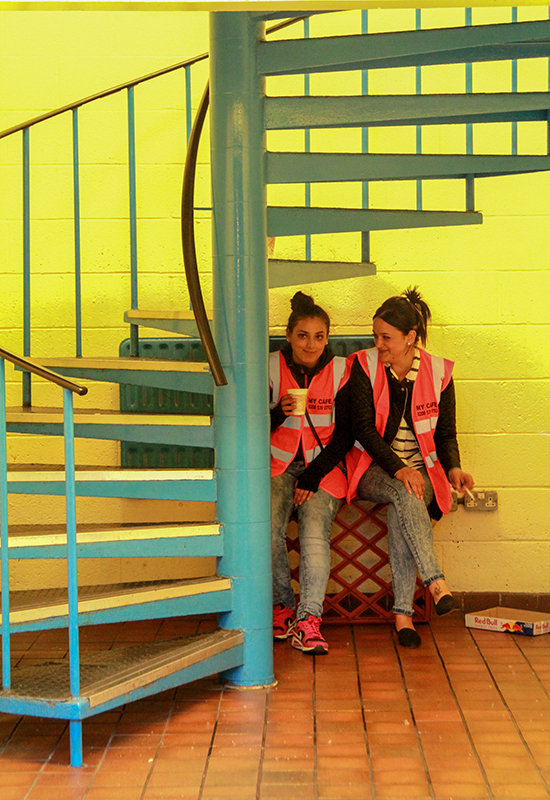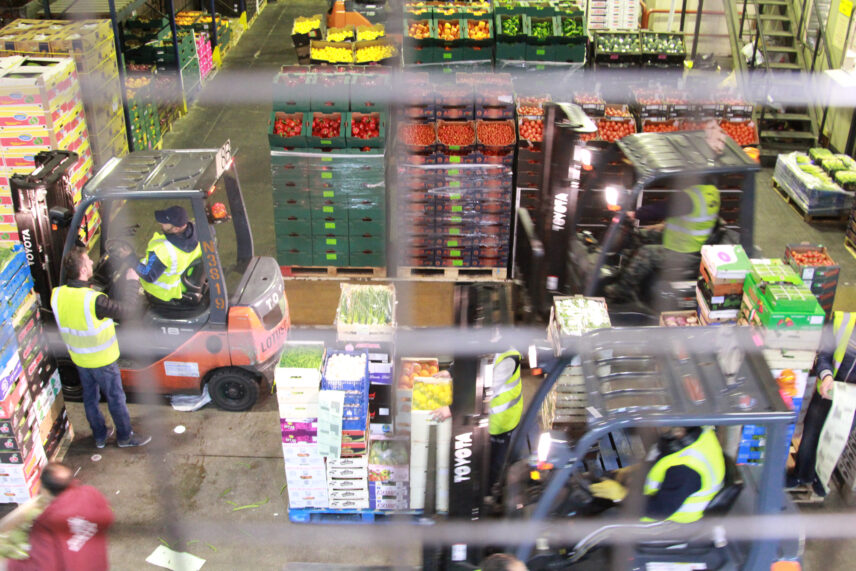Article begins
I first entered New Spitalfields one freezing night, in late November 2014. The frenetic pace of this nighttime market feels exhausting for the onlooker. The dark is floodlit and dims the hustle and bustle of daytime worries beneath humming voices and the rumble of forklift engines.
Night shifts throb with movement, machinery, and noise, with workers’ bodies and their biological rhythms. Working as a loader at this wholesale market for nearly a year, I have come to understand why nightworkers suffer from sleep deprivation and the physical aches and pains that come from lifting heavy loads and doing repetitive, monotonous tasks. Their work keeps our 24-hour societies running, yet they remain largely invisible.
From 10:00 p.m., when the night shift starts, all 16 gates of this vast wholesale fruit and vegetable warehouse stay wide open through the night. The cold wind ebbs and flows through these gigantic metal gates, leaving manual workers with few options to escape the chill. In the quiet moments, waiting for customers’ orders to arrive, we shelter between the aisles; climb on banana, ginger, or garlic boxes warm with the heat produced during fermentation; place our hands on the heated metal frame of the forklift engine; or sip warm coffee and “specials” (spirits mixed with energy drinks).
In this cold, Flory shows up, lively and cheerful.
Flory works six nights per week as a café server in one of the five coffee shops located around the market. She is the first generation in her family of Turkish Cypriot migrants to be born in England. Her mother came to the United Kingdom from the Greek side of Cyprus and met her Turkish father. She is in her early twenties and is still attending college. She works nights, she tells me, “to stay out of trouble.”

As workers load boxes of vegetables onto pallets and forklifts roar along aisles, café servers walk long distances to take orders and deliver food and drinks to various stands or vans or into the hands of forklift drivers on the move. I ask Flory to monitor her steps with a mobile application like the one I use to monitor my nightly exertions. At the end of the shift, we have walked nearly the same distance: 10 miles.
Whenever Flory passes by the fruit and vegetable stand where I work, I see her smiling and laughing with my coworkers. She is fluent in English and Turkish and talks away with Bulgarian Turkish, Romanian Turkish, Kurdish, Bangladeshi, and Pakistani workers. These cordial encounters always result in sales of drinks or food. She even sells more to the English market traders than to the rest of the migrant-owned stalls. “They prefer me, as I am more outgoing, flattering them, laughing with them.”
Her social assets also come with a price in this night market where café owners compete fiercely for business. She tells me, “My boss won’t let me work in any other café at this market.” And she goes on to unravel why:
Because the [other] girls here, make sales of £80 to £100 per night shift. I, on the other hand, am so good with people that I could easily make £200 per shift. And that’s why he won’t let me go and work for the other coffee shops. If I would work for the other café owners, I would take all his customers with me. Here, it’s to do with who makes more sales, who grabs the next customer.
Flory admits that sometimes she would have liked to work at “Joe’s café, where they gave me a pay rise. But my boss refused me. And I must accept his terms or forget about working at this market. But I like it here because I keep bonding with people.”
Flory’s witty manner explains not only why male customers prefer to banter with her and buy drinks and food from her, it also shows what is at stake for someone with excellent social skills. In full view of her colleagues, boss, and customers, Flory says she’s only got 20 minutes to speak with me. In passing, Ali, a Turkish male coworker with whom she is close, stretches his arm around her shoulders, and says while smiling, “When you work with someone like Flory, there is nothing like a night job. I recommend nightwork to anyone.” I must have looked puzzled, but Flory smiles my way approvingly.
Alexa dishes out drinks at another café. Unlike Flory, she found herself worn out by the demands of nightwork: “My life was spent on work, sleep, work, sleep. I was physically exhausted.” After her manager refused to grant her a night off, Alexa missed her next shift only to be docked two nights’ pay. Eventually, she left to work for someone else. It was not uncommon for women servers and cashiers to encounter exploitative practices or experience harassment at the hands of male colleagues or managers.

Flory, nonetheless, seems to navigate her way carefully and skillfully among the male loaders, porters, and managers. Along with the amiable smiles and hundreds of cups of hot drinks that Flory delivers, she listens to tales of migration, family unification or partner separation, loneliness, and deceitful relationships that eventually break down.
Working at night in this market café fulfils more than just making good sales; it has a social dimension. I don’t know, you feel like a lonely person. Yeah, I would say [that about a] night job. There are so many people at the market, working here at night and they broke up with their wives who would cheat on the men who had no time for them. Many people explained to me… ‘cause you know… I build up relationships with people, and they tell me everything… so when they wanna talk to someone, they come to me.
Philosopher and political theorist Hannah Arendt presciently warned that the 24-hour economy and its offspring, consumerist culture, would devour and discard everything that it met, from production to the end consumer. In this process of “creative destruction,” the rhythmic balance between “exhaustion and regeneration” is so frail and unsustainable that things (and humans’ condition) exhaust themselves before they can regenerate or cut themselves out of the busyness of daytime rhythms and relationships. In her earlier works, Arendt also envisioned that the masses, which grew out of a “highly atomized society,” act in “isolation and lack of normal social relationships.” The disconnects and vulnerabilities described in these nightwork scenes ought to be tackled, but it is extremely difficult to reverse these atomization processes and engage atomized workers to change their precarious situation, let alone mainstream society, policymakers, and the public (see Macarie 2017 for a detailed discussion). As Flory admits,
They, the people I associate with here, are good. That’s what I reckon brings me back. Because obviously, you don’t have much … when you work here you don’t have a social life. The vast majority literally cuts off their social life [outside of this market].
Flory thrives as a café server because she has grasped an essential part of working at night. She schmoozes customers and workers; she’s the soul-soother of the night shifters with a friendly ear, helping people cope with the demands of the night shift. Her use of social skills and amiability remind me of the hostesses Anne Allison describes in her work on a Tokyo “hostess club,” who provide a kind of “functional lubrication” as they flirt with and flatter their white-collar male clientele. Although Flory describes the “stroppy” manner of other servers, many of whom also lack the multilingual fluency to converse easily with customers, she crafts a kindhearted nightwork sociality through smiles and repartee, through sharing and listening to stories.
Some night shifts are quiet. The silence of the usually clangorous space is heightened by fear and seething anger.
Loaders wait, expecting orders that do not come because of some slowing down in the delivery chain. Business owners suffer losses, and this is enough to amplify worries among workers acutely aware of their expendable existence. As a worker (and participant observer), I was told to stay back for a team meeting at the end of one 11-hour-long shift. “Arkadaşlar” (friends in Turkish), the manager addressed us, “if you do not change into faster workers, I will replace you! You are out! I can replace you very easily because every night, men with forklift driving and manual skills alike are coming to ask for work, every evening!” After one such episode of blaming and shaming, Roman, a Turkish Romanian male, confessed on the way out that over the eight years he had worked at this night market, for various companies and in different capacities, he had never felt so resentful as he felt at that moment: “I cannot bear it anymore to see how management is putting their anxiety onto us. I do not take that, and I will leave without notice.”
Night shift work is unstable work, the workers dispensable. It is not unusual for people to be fired without notice if business is slack. Later, when the owner needs extra labor power again, they bring the same workers (or new ones) back in.
On other nights, business is brisk.
Thursday nights are always frantic because hundreds of grocers descend on the market to stock up on produce to cover the weekend trade. The orders come thick and fast, and the rhythms intensify; people shout at one another and swear in loud voices. Forklift drivers honk their horns, and the screech of brakes punctuates the night shift soundscape.
On these occasions, New Spitalfields resembles pandemonium, with people rushing about and bumping into one another. Loaders and drivers will be sweating and discarding a couple of layers of clothes even before the gates open. At midnight, when the wholesale customers and public rush through the gates, a long trail of forklifts and vans begin to zoom in and out of the market. As customers park their vehicles and walk quickly to their preferred grocery stands, the loaders bend and lift boxes, constantly on the move. Three hundred nights a year, male loaders carry tons of produce on their bodies, forklift drivers transport thousands of pallets, and women servers walk thousands of miles on foot between the café and market stands, lorries, or customers’ vans parked throughout the market.

So workers learn to respond to the intensity of bodily movements, to walk faster or run, to think of shortcuts to reach the produce. The loaders learn techniques to enable them to lift more crates, more sacks at a time. For example, tomatoes are sold in 5 kg crates, and they sell very quickly. On a nightly basis, loaders carry thousands of crates of tomatoes: one customer could order up to 128 crates in addition to more than 200 other items. Thus, loaders need to move quickly. All this is possible because of people like Gică—the foreman whose role is that of market “drill sergeant.” Every grocery store has a Gică.
On a nightly basis, Gică supervised the loaders: the workers occupying the lowest position in the grocery store hierarchy; the people with the most precarious jobs in the night market. He barked out orders, interrupted loaders mid-sentence, referred to them in derogatory terms, and failed to move out of the way as they shifted heavy loads. Like all supervisors, Gică diligently followed this form of labor discipline passed down from upper management and practiced night after night on his colleagues’ beleaguered bodies. He had worked for the company for a long time and in various roles, never being offered promotion beyond belligerent drill sergeant.
Gică drilled a regime of discipline into the workers, who executed his demands docilely in bodily responses of exhaustion, perspiration, and frustration. I, too, experienced his menacing tactics deep under my skin. A few months into my position, Gică told me, “From now on, you will report to me or to the manager every time you want to go to the toilet.” I conformed from fear of losing access to the field site and participants, despite the anger and injustice I felt. Like my coworkers, I went along with his orders and performed the loading drill under his watchful eyes. No manual worker dared to disobey his orders or show support towards another coworker during moments of verbal aggression.
Workers learn to respond to the intensity of bodily movements, to walk faster or run, to think of shortcuts to reach the produce.
Everyone seems focused on their own tasks, on the next job that will get them one step closer to the end of the shift. No one has time to ask themselves if they should be kinder and help their coworkers. They know that if someone else is not doing their bit, the work will fall to them. They are compelled to weigh things up to survive the night: taking the lightest order that they can; taking shortcuts to stave off exhaustion; sneaking out of the market for a revitalizing sting of morning air. So, they stay awake and alert and survive another night because they become immune to one another’s needs, not because they offer mutual support on the night shift.
Nightworkers are so caught up in the physical demands of work that forms of solidarity have become fragile and secondary to the overwhelming experience of occupational fatigue.
Loaders toil and sweat night in, night out as they carry produce. The nightly exhaustion intrudes into social lives and permeates the daily episodes of private existence. Like a double-edged sword, nighttime work represents, for some workers, the most profitable way to support their family. For loaders like Murad, the price he pays is reflected in time away from family while at work and sleep cravings while at home during the day. Murad complained of bodily exhaustion caused by the interminable night shifts and repetitive manual labor coupled with desynchronization and sleep deprivation. As he explained, “Sometimes, you’re lucky if you sleep three to five hours. Other times, you sleep eight to ten hours, but it is still not enough because day sleep is not the same as night sleep.”
Most nightworkers are too worn out, physically and mentally, for sociability or solidarity. On Saturday mornings, loaders and drivers drink and play cards with colleagues working for the same company, rarely mixing with others. The only times I observed any sign of sporadic cooperation was when something happened to disrupt the flow of everynight activity, such as the time a one-ton pallet of prunes fell onto the floor and all the workers in a team gathered around to pull it all together. The coworkers who witnessed the pallet falling and heard the loud bang that followed reacted spontaneously, gathering to pick the fallen fruits. In that moment of trivial disruption, the intent of solidarity floated; all men were working together towards the same goal, but each was invested in their individual tasks. In other words, they were doing something together but not with one another. And once all prunes were repacked, the workers took their separate places, apart from one another, looking at the clock and eager to go home.
Loaders are for the most part focused on surviving the night shift, not building bonds. Showing concern for another’s perilous situation is seen as weakness. The migrants next to whom I worked night shifts rarely cooperate or mobilize for social justice.
To create a more engaged workforce, we need to deal with this post-circadian capitalist regime of production, which disrespects the body’s need to rest and sleep, and leaves laboring bodies spent and exhausted before dawn. The predicament of the fatigued workers of contemporary societies is a social and political injustice that calls for public attention and bold solutions. My Nightworker Charter offers practical solutions for improving the rights of nightworkers and ways to engage nightworkers and build broad coalitions to demand dignified working conditions for those who work through the night. You can become a signatory and recommend the charter to unions, labor organizations, employers, local and regional councilors, and health and safety organizations.
Author’s note: This research was supported in part by a grant from the Ministry of Research, Innovation and Digitization, CNCS-UEFISCDI, Project No. PN-III-P1-1.1-BSO in 2016-003, PNCDI awarded to the author by the New Europe College, Bucharest within the “Stefan Odobleja” Fellowships 2021–2022. All the names in this story are pseudonyms. Thanks to Magdalena Craciun for her critical input. Special thanks to Natalie Konopinski for her insightful comments on previous versions of this piece.

